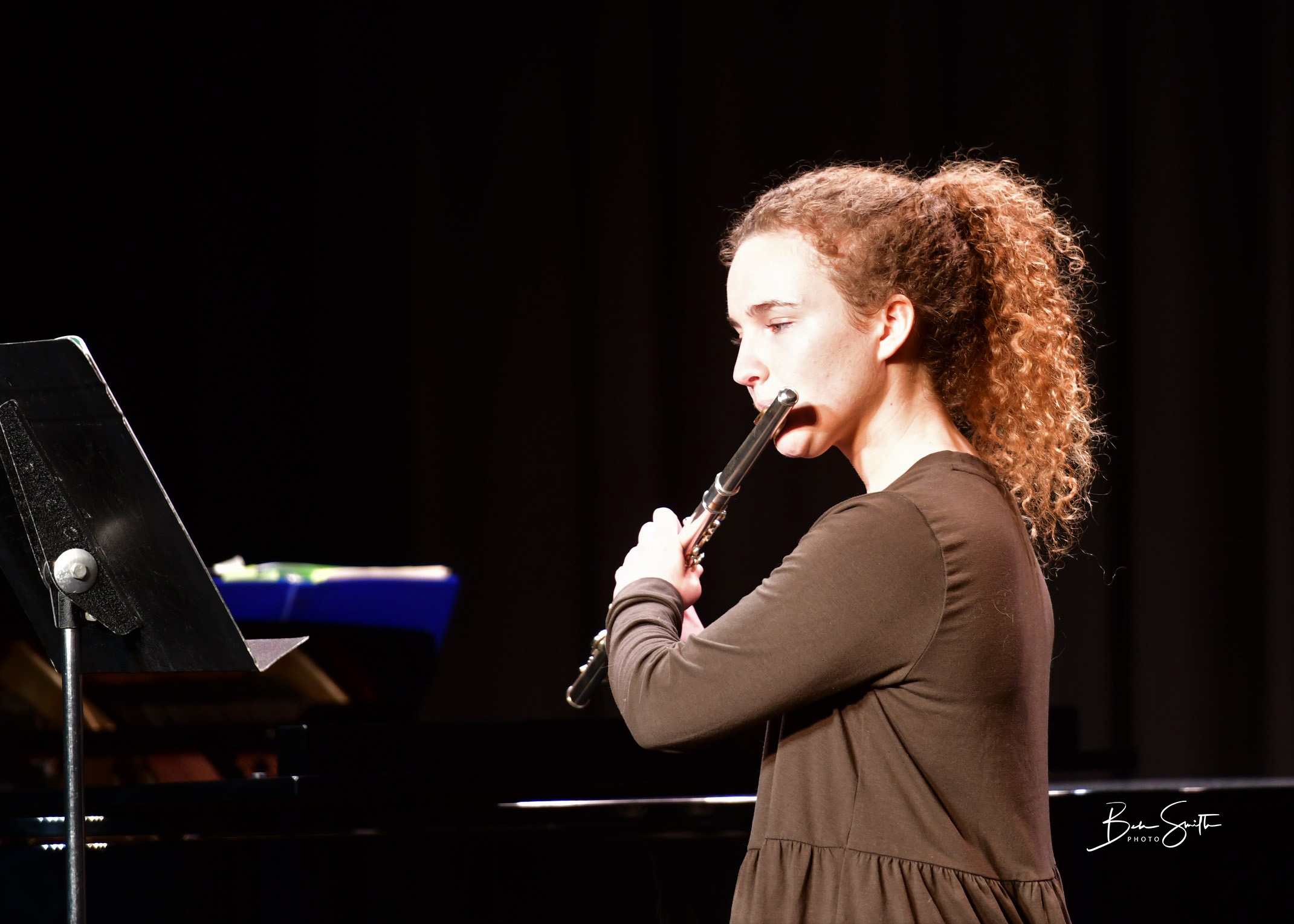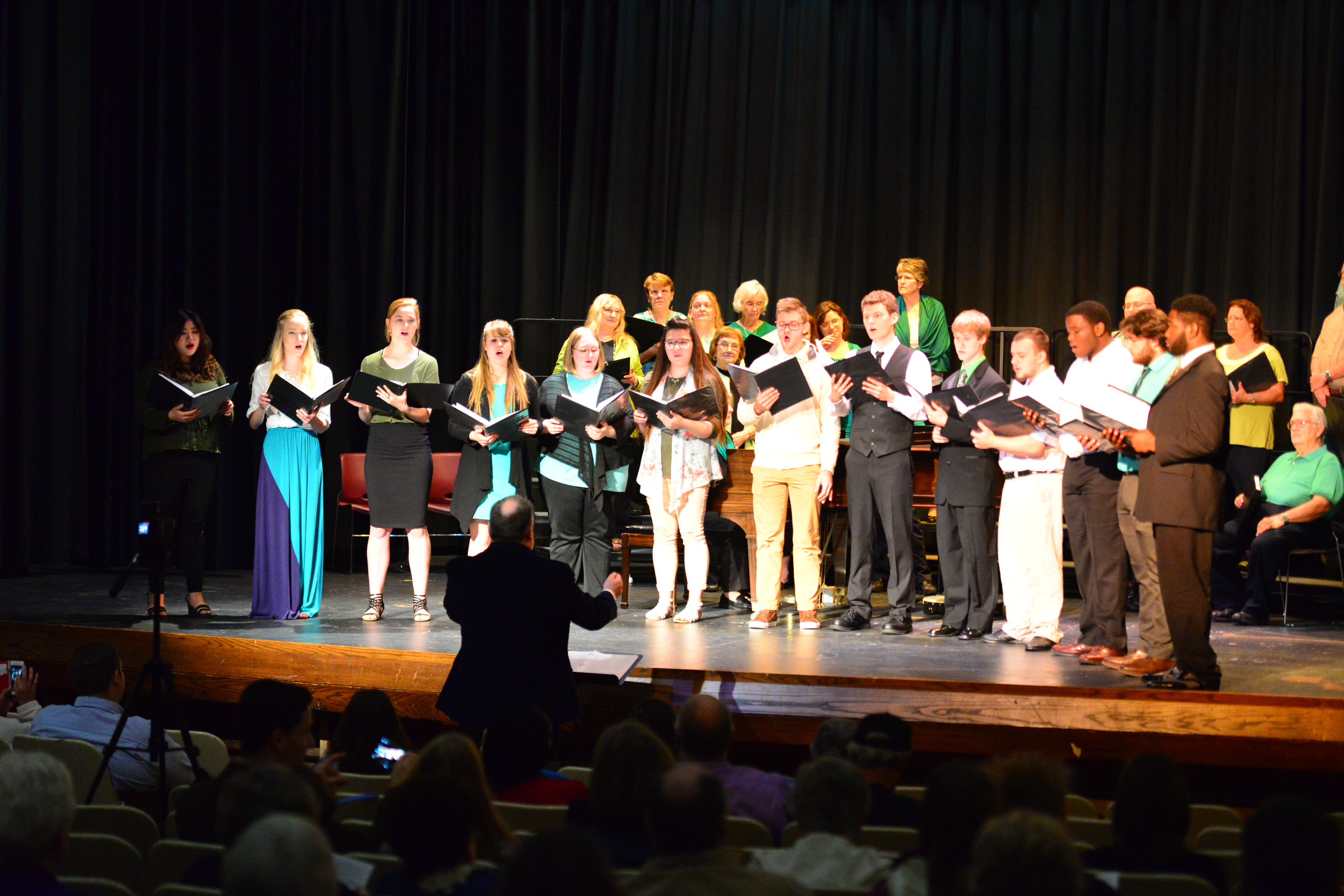|
Award Levels
|
Credit Hours Required
|
Time to Completion
|
|
Associate of Arts
|
64
|
2 Years
|
 The Associate of Arts with an emphasis in Music is designed to prepare students for a transfer to a four-year institution. Students receive a basic foundation on which they can build, including private instruction in voice and piano. The Associate of Arts with an emphasis in Music is designed to prepare students for a transfer to a four-year institution. Students receive a basic foundation on which they can build, including private instruction in voice and piano.
Music scholarships are available for all qualified students, regardless of major/degree. These scholarships are a fixed amount each year, and they cover approximately 15 hours of tuition and books. Completion of 12 hours per semester with a 2.0 grade point average, satisfactory participation in specified ensembles, and participation in various recruiting activities are required to maintain a scholarship. Contact Mr. Murray for details.

|
|
|
|
Interested in this program?
Contact an Advisor!
advising@neosho.edu
(620)432-0311
Program Coordinator
Mr. Alan Murray
Office: (620)432-0377
amurray@neosho.edu
|
Performance Groups
Concert Choir: The Concert Choir rehearses in conjunction with the St. Cecilia Community Choir on Monday nights each semester and performs secular and sacred music from various time periods, folk songs, spirituals, and contemporary favorites. Open to all students without audition.
Vocal Ensemble: This student group rehearse 3-4 times per week and performs literature suitable for small ensembles (Jazz/Pop/Classical). Open to all students by audition.
Instrumental Ensemble: The Band at NCCC performs music appropriate for the ensemble each year. They rehearse 2-3 times per week and include stage band and concert band instruments in the ensemble.
Recommended Sequence of Courses
(Fall) Semester I
|
|
Credit Hours
|
|
MUSI 110
MUSI 114
MUSI 187
|
Band or Vocal Ensemble or Concert Choir
|
1
|
|
MUSI 109
|
Applied Music (Voice/Instrument)
|
1
|
|
MUSI 109
|
Applied Music (Piano)
|
1
|
|
MUSI 101
HPER 150
|
Music Fundamentals and Lifetime Fitness or Arts/Humanities Elective
|
2
1
|
|
CURR 100
|
First Year Seminar
|
1
|
|
ENGL 101
|
English Compositon I
|
 3 3
|
|
MUSI 120
MUSI 123
|
Music Appreciation or Music in America
|
 3 3
|
|
COMM 207
|
Fundamentals of Speech
|
 3 3
|
| |
Total
|
16
|
(Spring) Semester II
|
|
|
|
MUSI 110
MUSI 114
MUSI 187
|
Band or Vocal Ensemble or Concert Choir
|
1
|
|
MUSI 109
|
Applied Music (Voice/Instrument)
|
1
|
|
MUSI 109
|
Applied Music (Piano)
|
1
|
|
MUSI 104
MUSI 140
|
Music Theory I or Music in the Elementary Classroom
|
3
|
|
ENGL 289
|
English Composition II
|
 3 3
|
|
PSYC 155
|
General Psychology
|
 3 3
|
|
HPER 150
|
Lifetime Fitness or Arts/Humanities Elective
|
1
|
|
MATH 113
|
College Algebra
|
 3 3
|
| |
Total
|
16
|
(Fall) Semester III
|
|
|
|
MUSI 110
MUSI 114
MUSI 187
|
Band or Vocal Ensemble or Concert Choir
|
1
|
|
MUSI 109
|
Applied Music (Voice/Instrument)
|
1
|
|
MUSI 109
|
Applied Music (Piano)
|
1
|
|
CSIS 100
|
Computer Concepts and Applications
|
 3 3
|
|
MUSI 108
|
Aural Skills I
|
2
|
|
|
Biological Science w/Lab or Physical Science w/Lab*
|
5
|
|
|
Social Science Elective
|
3
|
| |
Total
|
16
|
(Spring) Semester IV
|
|
|
|
MUSI 110
MUSI 114
MUSI 187
|
Band or Vocal Ensemble or Concert Choir
|
1
|
|
MUSI 109
|
Applied Music (Voice/Instrument)
|
1
|
|
MUSI 109
|
Applied Music (Piano)
|
1
|
|
|
Biological Science w/out Lab or Physical Science w/out Lab*
|
3
|
| |
Art/Humanities Elective
|
6
|
| |
Social Science Elective
|
3
|
| |
Free Elective
|
1
|
| |
Total
|
16
|
|
Associate of Arts Degree Program Credits
*One of the science courses must be biological and one must be physical.
|
64
|
|
 Courses marked with this symbol are approved by the Kansas Board of Regents for guaranteed transfer among all Kansas public postsecondary institutions. Additional courses may be eligible for transfer. Please visit the NCCC Registrar to learn more. Visit Kansas Board of Regents Transfer and Articulation website for additional information. Courses marked with this symbol are approved by the Kansas Board of Regents for guaranteed transfer among all Kansas public postsecondary institutions. Additional courses may be eligible for transfer. Please visit the NCCC Registrar to learn more. Visit Kansas Board of Regents Transfer and Articulation website for additional information.
|
Students will develop an understanding of the following:
1. Basic elements of music, including sound, pitch, dynamics, and tone color
2. Combining basic elements of music to construct melodies, harmonies, rhythm, and meter.
3. Using melody, harmony, rhythm, and meter to determine form and texture
4. How form and texture, along with societal mores, determines historical style
5. The multiple functions of music for individuals and societies
6. The notation system of Western music in composing and performing music
7. Role and nature of various performing ensembles
8. Role and nature of solo performance